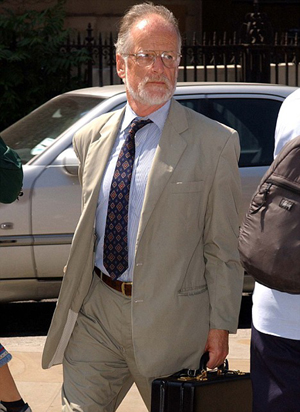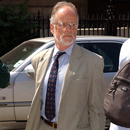KGB man: MI5 agent told me that David Kelly had been 'exterminated'
The Daily Mail
Sat July 24, 2010
Area: Oxfordshire
The mystery over the death of David Kelly took a further twist last night after a former KGB officer said he had evidence that the scientist did not commit suicide.
Boris Karpichkov, who worked as a Russian spy for 15 years before fleeing to Britain, has sent a dossier to Attorney General Dominic Grieve in which he claims to relay information from an 'MI5 agent' that Dr Kelly had been 'exterminated'.
His move comes amid increasing calls from within the Coalition Government for a full, independent investigation into Dr Kelly's death.
Mr Grieve has indicated that he is 'concerned' by the growing scepticism among experts about the official version of events.
Dr Kelly was found dead in woods near his Oxfordshire home in July 2003, after the Government exposed him as the source of a BBC report questioning Tony Blair's case for war in Iraq.
There was no full coroner's inquest - instead, Lord Hutton chaired a public inquiry which concluded Dr Kelly died from loss of blood after slashing his left wrist with a blunt garden pruning knife.
A number of doctors have since come forward to say that the incision could not have caused his death.
Mr Karpichkov, who sought political asylum in the UK in 1998 and now has British nationality, says he met the 'agent', Peter Everett, on dozens of occasions while carrying out work for Mr Everett's company Group Global Intelligence Services, which hiredex-MI5 operatives for corporate detective work and infiltration.
In the document sent to Mr Grieve, Mr Karpichkov says that during one of their meetings, two days after
Dr Kelly's body was found, Mr Everett told him that Dr Kelly had been 'exterminated' for his 'reckless behaviour'.
Mr Karpichkov, who says that Mr Everett indicated that he was an 'active field operative' for MI5, writes: 'He told me that it was extremely uncomfortable, inconsistent and unusual for Dr Kelly to slash his arm in the way he did. He would have lost some blood, but it would not have been fatal.
'He also claimed that it was not a coincidence that Special Branch officers were the ones who first appeared on the scene - they moved Dr Kelly's body to another location, changed the original position of his corpse and took away incriminating evidence.
'He added that the scene where Dr Kelly's body was found was carefully arranged and completely "washed out", including the destruction of all fingerprints. When I asked who was behind his death, he [Mr Everett] answered indirectly, saying the "competing firm", which I took to mean MI6.'
Last night, Mr Everett - who is believed to be in his late 50s and whose former company was registered to his home address in Dulwich, South-East London - admitted meeting Mr Karpichkov on a number of occasions, and recalled discussing the manner of Dr Kelly's death.
He said: 'We had a general conversation about the David Kelly case, in which I said that it was very unusual for him to have slashed his wrist in that way.
'That is all I said. I do not have any particular inside knowledge on it.'
Asked whether he was a current, or former, MI5 operative, he said: 'I am not commenting on that.'
Asked if he had carried out work on behalf of the agency, he said: 'I have spent a number of years working in the world of intelligence.'
Associates indicated that his work on behalf of security agencies was indirect, rather than as a paid operative.
Mr Karpichkov's testimony reflects the continuing debate in the intelligence community and associated agencies over Dr Kelly's death.
He fled to Britain from Latvia with his wife and two sons after being accused of stealing £310,000 from a failed bank, although he claims that he was framed by the Russian mafia.
According to Latvian newspaper reports, he was recruited by the regional KGB in 1981, trained at the Secret Services School and served as a special forces operative during the war in Afghanistan.
After the Cold War, he was assigned to undercover work in Latvia.
Mr Everett's former company, Group Global Intelligence Services, which was dissolved in 2006, normally operated in the shadows.
But in 2004, it was accused of placing six members of its staff at Manchester United's Annual General Meeting as 'plants' to ask embarrassing questions about manager Sir Alex Ferguson's transfer dealings.
At the time, Sir Alex's business rival John Magnier was known to be hiring private eyes to investigate the United manager.
When confronted by journalists, Mr Everett said: 'I was nothing to do with that side of the alleged operation.'
Ministers increasingly believe that the continuing speculation about Dr Kelly's death - fanned by the fact that he emailed a friend on the morning he died to warn that there were 'many dark actors playing games' - will not end until a proper inquest is held.
Earlier this month, one of Dr Kelly's close female colleagues, Mai Pedersen, wrote to Mr Grieve reiterating what she had first revealed in an interview in The Mail on Sunday in August 2008, saying that Dr Kelly had been too weak to cut his own wrist - because a hand and arm injury meant he even had trouble 'cutting his own steak', and he would have to have been a 'contortionist' to have killed himself.
She demanded a 'formal, independent and complete' review of the case.
Her claims are backed by 13 specialist doctors, who have compiled a dossier rejecting the Hutton conclusion on the grounds that the cut to the ulnar artery could not have caused death.
In addition, it was recently disclosed that Dr Kelly's death certificate was not properly completed.
It was not signed by a doctor or coroner and does not state a place of death, leaving open the possibility he died somewhere other than where his body was found.
Furthermore, the pruning knife has been revealed to have had no fingerprints on it.
Campaigners are aggrieved by a mysterious decision to classify all evidence relating to the post-mortem for 70 years.
But they are encouraged by the fact that one of their most vocal supporters, Lib Dem MP Norman Baker, who has written a book questioning the Hutton verdict, is now a member of the Coalition as a Transport Minister.
A spokeswoman for Dominic Grieve said last night: 'Mr Grieve expressed concerns about this issue when in opposition and has, since taking office as Attorney General, been exploring with ministerial colleagues any actions that may be taken.
'No decisions have been made.'





 Share your thoughts in the Forum
Share your thoughts in the Forum